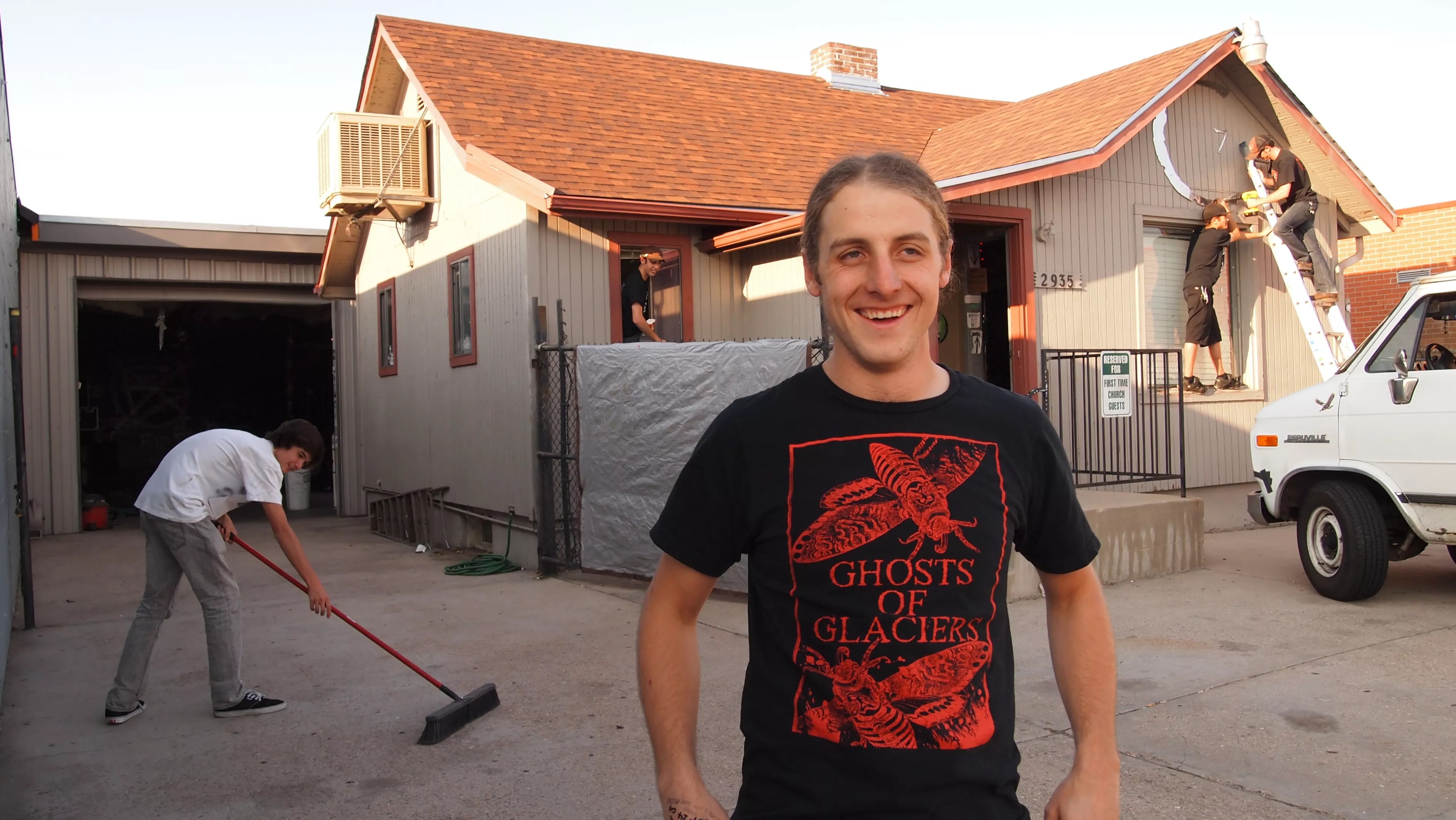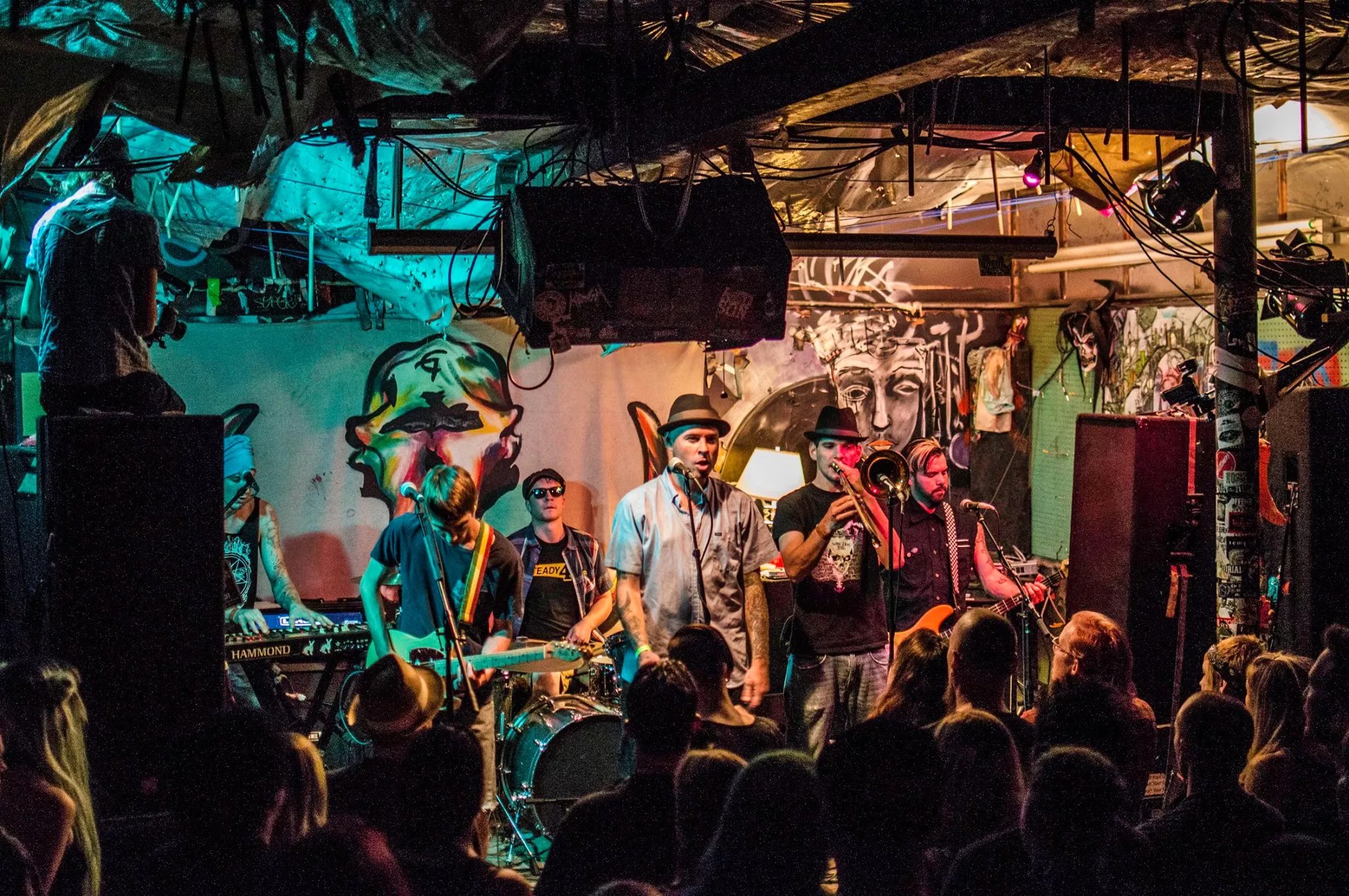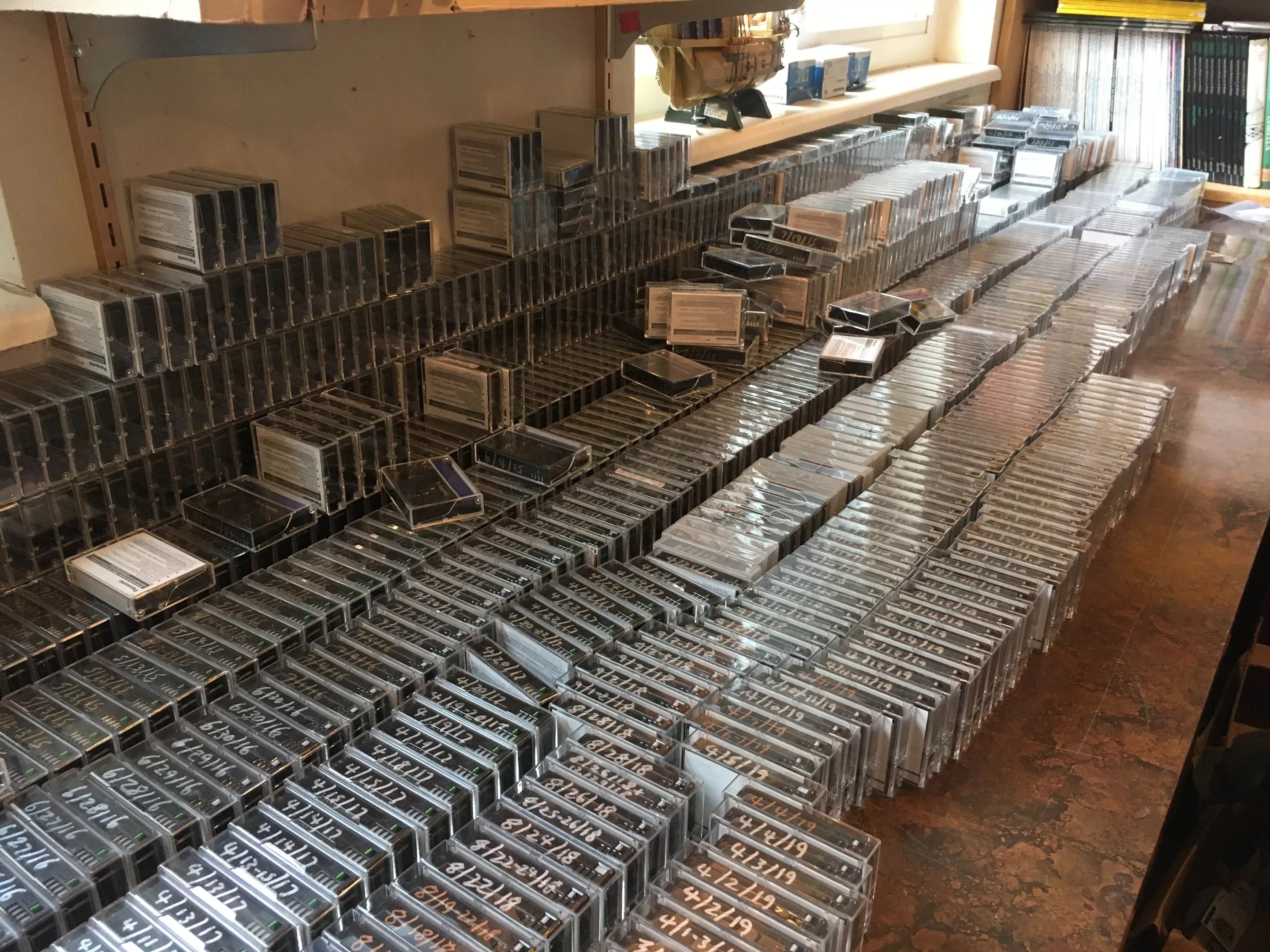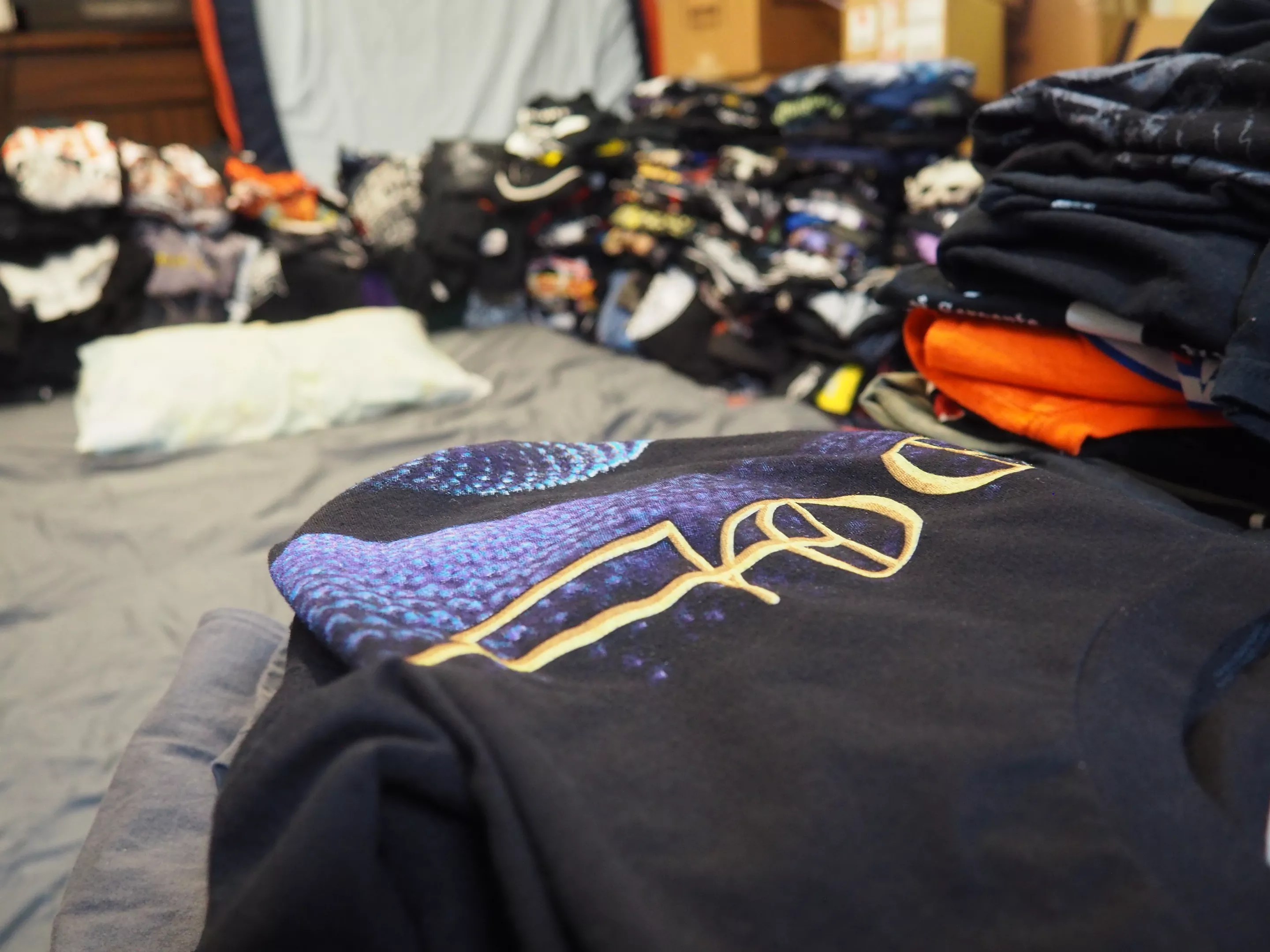
Geri Saye

Audio By Carbonatix
Tucked amid Sun Valley’s sea of school buses and industrial lots is the quaint Denver DIY venue Seventh Circle Music Collective. Concert-goers enter through a house-turned-storefront before heading out back to an outdoor patio and into the garage, where the stage is located. Layers of band stickers are slapped on seemingly every surface, a testament to the eleven years over which the community hub has staged local live music across the genre spectrum, as well as a number of notable touring artists, including Agent Orange, Tigers Jaw and many, many more.
The space at 2935 West Seventh Avenue has been home to music communities in punk, hardcore, EDM, hip-hop and more for almost two decades, with Seventh Circle opening in September 2012 to maintain the spirit of the spot’s previous venue, Blast-O-Mat. It’s impressive for any DIY community-run venue to operate for an extended period of time, let alone to offer an equally impressive lineup of shows. But Seventh Circle calls itself a music collective, and its longevity has been bolstered by a dedicated team of volunteers and passionate music enthusiasts who come together to make the shows happen, even since the Blast-O-Mat days.

The Bunny Gang playing a concert at Seventh Circle.
Mark B. Caraway/Picks and Spokes Photography
Aaron Saye initially conceptualized Seventh Circle with fellow Blast-O-Mat volunteers after discovering that the original venue’s residents and show runners would be moving on. The venue changed hands within that community several times during the six- or seven-year period it was open, and while some stayed around Denver and others moved away, the final residents decided to let the Blast-O-Mat era end.
Still, Saye refers to Blast-O-Mat as a “hallowed venue in Denver DIY history,” adding that he feels humbled to be able to uphold the space’s legacy. He remains good friends with some leaders of the former venue, including final resident and Primitive Man member Ethan McCarthy. In the transition, McCarthy and other Blast-O-Mat leaders asked only that the venue’s name be changed, and with some minor redecorating and new sound and lighting systems, Seventh Circle Music Collective was born.
“‘We know that we love volunteering at Blast-O-Mat; we love this venue, and we don’t want it to die,'” Saye recalls thinking at the time. “‘So let’s try and keep it going on our own. But let’s just see what happens. If it doesn’t work, if it’s not sustainable, then we’ll lose the money that we put into it, and that’s just the risk we’re willing to take.'”
Blast-O-Mat held its final show on August 25, 2012, and Saye and other volunteers took over the building on September 1. Seventh Circle’s first show, Grand Opening Festival, took place just weeks later, on September 22.
Before long, Saye and other volunteers were regularly hosting shows at the revamped venue, often with very little time off. In March 2013, for example, Saye says the team of volunteers took only three days off from concerts for the entire month. By that point, Seventh Circle was able to sustain itself.
“Within a month and a half of being open as Seventh Circle, we had two really big shows in a row that collectively brought in enough money to pay a month’s worth of rent,” Saye recalls. “And we went, ‘Oh, my God, we just paid rent in two shows. I think this thing has legs, you know? I think that it’s gonna work.'”
For many years after, Seventh Circle hosted around five shows per week, and Saye was the self-described “everything guy.” From paying rent and handling all the business happenings to running sound and booking, Saye was doing it all, with help from a handful of committed volunteers.
In the seven-and-a-half-year span between opening in 2012 and the beginning of the COVID-19 shut-downs, Seventh Circle hosted an incredible amount of live music. Saye says the official concert count reached 1,788 by the start of the pandemic, averaging around 238 shows per year. That’s a lot of work week to week for an “everything guy” and a team of volunteers, and Saye and the crew were running on empty much of the time.
When the pandemic began, Seventh Circle closed for a year and a half with enough money in the bank to keep itself alive in the meantime, even without concerts. Despite the uncertainty of whether live music would ever come back, Saye reflects on that time as a much-needed break – and a means to find a healthier, more sustainable way of hosting DIY shows for a music community in need.
“Everybody had the luxury of just being able to walk away and focus on their own lives, myself included, and to just not worry about Seventh Circle at all,” Saye recalls. “We just locked the place up and that was that, and everybody went into hibernation or whatever for COVID.”
He adds that the downtime provided a newfound respect for self-care and an increased awareness about how to be healthy as a DIY venue. It turns out that booking, promoting and running five shows a week may not be the healthiest option, and the venue’s return came with a renewed sense of delegation, community and personal well-being.
“That was a huge defining moment for me,” Saye says. “It was like this huge weight floated off my shoulders that I didn’t even realize had piled up until it went away. For like a year, I kind of did a bunch of self-analysis and was just like, ‘What was it about Seventh Circle that had gotten so bad for me and so stressful and unhealthy?’
“I did all that analysis and figured out what I wanted to be responsible for still when we reopened and what I didn’t want to,” he continues, “and it’s been a lot healthier since then for the last year and a half, or whatever it’s been since we reopened.”
Seventh Circle is now down to just two or three concerts a week, and each is run by the individual volunteer who books it. Saye still books the occasional show every few months, and he says the change has been positive for himself, the volunteers and the concerts themselves.
With more people involved in booking, he says, the venue’s offerings have been even better and more diverse than ever before. It also gave those who wanted to be more involved the chance to do so, and relieved Saye of the “everything guy” role.
“Every show has been bigger than they usually would have been when we were having five a week, because we’re not over-saturating the community with shows,” Saye adds. “And even though we’re doing fewer shows, the ones that we are doing are doing way better than they would have pre-pandemic.”
It’s not hard to imagine how passionate volunteers can end up burning themselves out, especially looking at what brought them to music in the first place. For Saye, ever the archivist of a robust Denver DIY scene, it started with filming live sets in the early 2000s. The practice gradually evolved as bands became more and more interested in his footage and audio, and he soon began filming nearly every show he attended.

A small part of Aaron Saye’s massive videotape archive collection.
Aaron Saye
Saye estimates that he’s filmed between 10,000 and 13,000 individual sets in the past nineteen years, and that’s just the tip of the archiving iceberg. His collection of tapes from filming live sets takes up an impressive amount of space in his house, all painstakingly documented. But filming came easily to him, beginning with a desire to create a live album of sorts for some of his favorite local and regional bands.
“It was really organic,” Saye explains. “It was just this situation where I realized, ‘Why not?’ As I got more into live music, every show, even if I was seeing the same band over and over again, was so different and so special. And I realized, this is so important.
“Somehow, there was some compulsion within me that felt like it was so important to document this magic just because it was happening,” he adds.
Saye has started a Patreon page for his film archives, meant to help recoup some of the tape costs and to give users access to unreleased footage via unlisted YouTube links. It’s dubbed “The Aaron Saye Archives,” and supporters who pay at least $4 monthly get access to one filmed concert per month, along with Saye’s searchable, unabridged list of all the shows he has filmed. Supporters at the $15-per-month level can submit requests for his monthly show release. Saye offers these videos to subscribers for no other reason than to help document history.
Beyond filming shows, Saye also has a long history of taking new bands out on the road for their first few tours, collecting an incredible number of band T-shirts in the process. He’s been posting his band shirts on Instagram and Facebook daily in alphabetical order since the beginning of 2020. Three years in, he’s nearing his 1,300th shirt – and he’s only on the letter G.

A pile of shirts from Saye’s personal band T-shirt collection.
Aaron Saye
With increased delegation, fewer shows and a healthier overall approach to Seventh Circle, Saye has had more time to continue tour management for small and big bands on a regular basis. Needless to say, it’s hoped that Seventh Circle will remain a Denver staple for many decades to come, and leaning into its collective approach might just be the way to do it.
“We’re still active. We’re still doing shows,” Saye says. “Feel free to hit us up if you want to get booked, or feel free to come down to a show.”
Find Seventh Circle’s upcoming shows on its website. Support Saye’s filming project on Patreon, or follow along with his shirt project on Instagram.